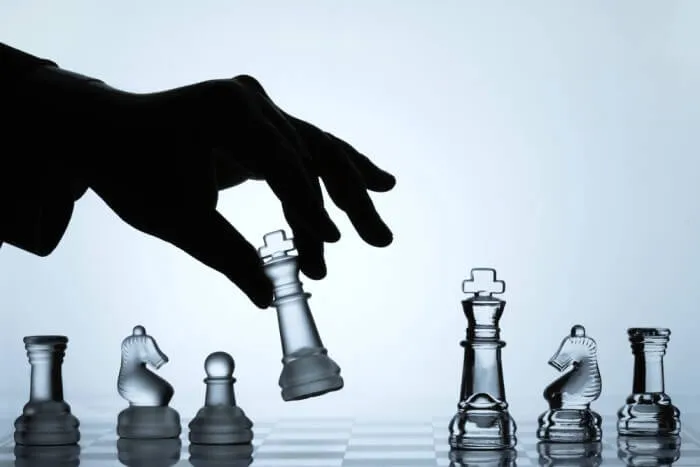
I like strategy games; both turn based and real time. When I was a kid (and adult) I beat Final Fantasy 1 multiple times. FF3 and FF7 (American) were also good. Turn-based RPGs don't actually have a lot of strategy, but I'd like to change that. In high school I played a lot of Starcraft. It's somewhat satisfying when you get accused of cheating and you're not.
Today, even with a debilitating shoulder injury (I use the computer left-handed) I rank in low-master/high-diamond on Starcraft 2. I played League of Legends for quite some time but I was never very good at it (forever gold/plat). I've also played stints of chess on and off over the years. My ELO is only 1600 on Lichess (1500 is the average) but the average player on Lichess is probably better at chess than 99% of people you'll meet on the street. I guess that's not saying much; chess isn't exactly a popular game anymore, especially when you consider that it's basically been solved by AI.
The first time I saw the board-game Go I was very intrigued. I saw it featured in the movie A Beautiful Mind with Russel Crow as the lead. I thought to myself, "What is this ancient looking board-game that I've never seen before?" Turns out, it was much more ancient than I could have ever imagined.
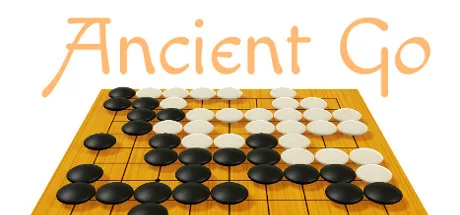
The game was invented in China more than 2,500 years ago and is believed to be the oldest board game continuously played to the present day.
This game is older than Christianity itself and is still being played. Pretty crazy when you think about it. By contrast:
Chess reached Europe by the 9th century, due to the Moorish conquest of the Iberian Peninsula. The pieces assumed their current powers in Spain in the late 15th century; the rules were standardized in the 19th century.
The rules are simpler, but gameplay is more complex.
The best games are easy to learn and hard to master.
Chess
In chess you have six kinds of pieces that all move differently. It's a hierarchical game based on old monarchies. If your king is captured, you lose the game. The goal is always to sacrifice your lesser ranked pieces in order to capture a higher ranked one. There are even points that have been assigned to each piece. These are especially relevant to AI programming.
- Pawn (1)
- Knight (3)
- Bishop (3)
- Rook (5)
- Queen (9)
- King (infinite)
Go
Go is an imperial game where each player seeks to enclose more territory on the board than their opponent. In the game of Go, there is only one type of piece, and it's simply called a stone. Any empty area that your stones control (encircle) count as point in your favor. More importantly, if you surround a formation of your opponents stones they become captured and removed from the board, creating more empty space. A captured piece is worth a point and an empty space is also worth one point.
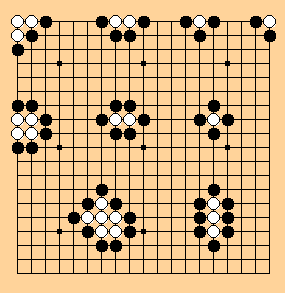
All of the white pieces to the left are captured and about to be taken off the board, creating empty territory owned by black.
The only rules for placing stones are these:
- You must place your stone on an empty intersection.
- You much not place a piece that will be captured immediately.
The game is over when both players voluntarily pass.
The rules make for some very interesting dynamics.
The board is massive.
The standard Go board is a 19x19 grid. This means that the first move has 361 possible outcomes. By contrast, the opening moves in chess are limited to 20 options. This was a big reason programmers thought that Go would never be solved by AI. Chess AI was dominating grand-master players over a decade ago. It's only been just recently that Go AI has been able to do that (with Google's DeepMind AlphaGo).
Additionally, in chess when you make an extremely over aggressive move you'll probably just outright lose the game. In Go you can play a piece directly in your opponent's territory. If the move is threatening enough for your opponent to respond and attack that piece, it doesn't matter if you lose the formation you've just built. Because capturing a piece is only worth one point and you are forcing him to fill his own territory (also one point each) with his own pieces, when your formation dies he hasn't gained any points. Instead, his victory over you will simply make his formation completely unkillable.
Making life
But what if your formation didn't die? By "creating life" in your opponent's territory you can take away a massive amount of points from them.
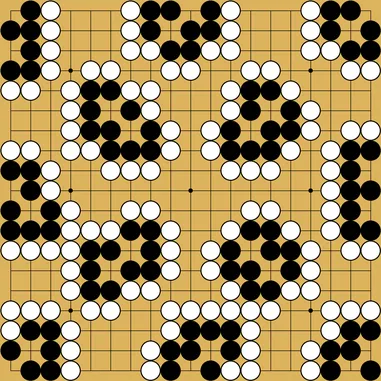
The black pieces to the left show the smallest formations possible that cannot be killed. They are alive because they have two "eyes". An eye is an unfilled space surrounded by your pieces. If your formation has two eyes it's impossible for your opponent to kill because doing so would require them to place two stones at once.
As you can see, it's easier to make life in the corners than anywhere else. You only need 6 stones. This is because the edges can be used to your advantage. On the sides it takes at least 8 pieces to make life and in the middle of the board it takes at least 10.
Just like reversi the corners are very important because they are the easiest to control. The game usually starts out with with stones placed 4x4 away from the corners in order to secure them. In fact, you can see that most boards mark the 4x4 intersection for you so the board is easier to read. The middle point between corners and the middle of the board are also of tactical important and marked on the board. These points are also used in handicap games.
Handicap and Rankings
Another feature of Go that makes it superior to chess is the handicap. In chess, when you play a superior opponent you pretty much can't win. In Go, the ranking system goes hand in hand with the handicap system. Go is primarily an Eastern game, so ranks are denominated the same as they would be in martial arts. There is a mastery level "Dan" and an apprentice level "Kyu" (pronounced "Q"). Funny how the master of this blockchain is literally named @dan.
Anyway, Kyu ranks go from highest to lowest. Kyu 25-30 would be a total novice. Kyu 1 would be just about to hit the first mastery level Dan 1. Mastery ranks go from lowest to highest. A Dan 1 is basically a black belt and Dan 7 would be some of the best of the best players.
If I was a Kyu 12 and you were a Kyu 20 we could still play a fun game together. In a handicap game, the superior player always plays white and the less experienced player plays black with a handicap equal to the rank difference. In this case, you would get to play 8 predetermined moves before I even get to play my first move. In essence, you'd own the whole board and I would have to take it from you.
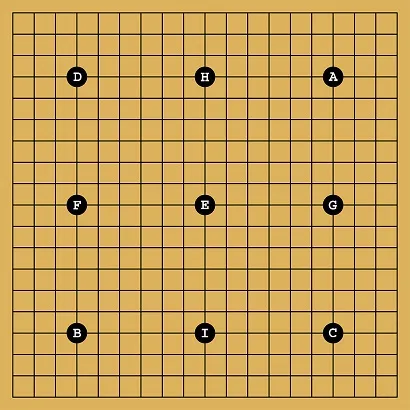
For every rank you are below me you'd get an extra stone on the board starting with "A" and ending with "I". I am actually very bad at handicap games because I play very aggressively. This gets me into a lot of trouble when I play a lower ranked opponent with a handicap. Just take a look at this game and see how I gave away every corner to take the middle. It's not a smart move, but it can be fun at lower ranks. This kind of playing would get me destroyed in a handicap game.
Still fun to play when you are losing.
In chess if you are behind everything feels hopeless and the urge to quit is real. All of your pieces can get locked down and there is nothing left to do but resign. In Go the board is so big that there is often some other piece of territory you can fight for if you lose the one you're working on. For novice players, continuing to play the game is much more fun because you can continue to learn on a even playing field as long as there is still open space to gain control of.
Surprisingly complicated
It's hard to imagine Go being a complex game without playing first. In this game I make an amazing move on turn 35. It's called a snapback. I place my stone in mortal danger, but if my opponent takes it his bigger formation becomes vulnerable and I can capture all three stones.
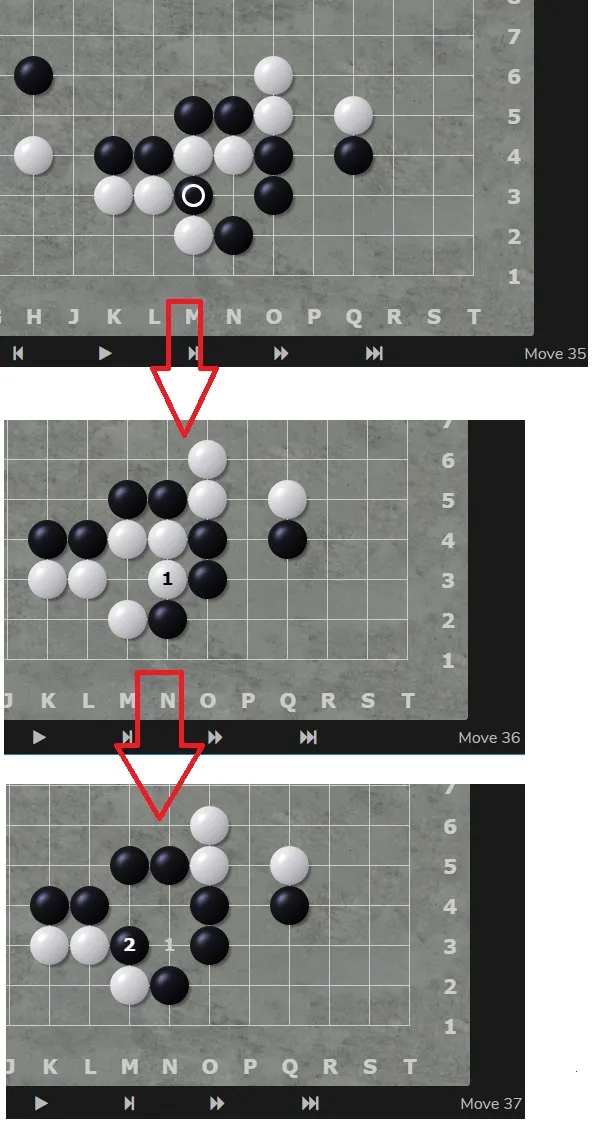
Very surprisingly complex situations like this happen all the time. The strategy for mastering game play is extensive while the rules are trivially simple. It's these combinations that really make Go a superior game to chess all around. I'm somewhat surprised that it's only popular in Eastern countries.
You can view all my Go games at
https://online-go.com/user/view/451439
and all my chess games at
https://lichess.org/@/Edicted
In my opinion, these are by far the two best sites to play Go and Chess respectively.
Why reinvent the wheel?
As you may or may not be aware. I've started a pet project to put Checker, Reversi, Chess, and Go directly on the blockchain. Why would I do this? Well first of all the projects are small and it will be great practice when i have bigger fish to fry. I won't make the same noob mistakes on bigger projects if I complete some smaller ones first.
Also, while these games would be quite inferior in many ways on the blockchain, having them here would be very interesting. I'd like to create an honor system that rewards players for not cheating. On top of this, by connecting games of skill to the blockchain it will be very easy to add some light betting to the action. This is something that no centralized organization would dare try to implement.
As an experienced poker player I know the law when it pertains to gambling.
- Betting on games of skill is not considered gambling.
- Zero-rake bets are not considered gambling.
Therefore, the blockchain provides the perfect opportunity to bet on games of skill with zero overhead. We have the justification to avoid regulation on both fronts. In addition, regulation is practically impossible to achieve anyway in this truly decentralized environment.
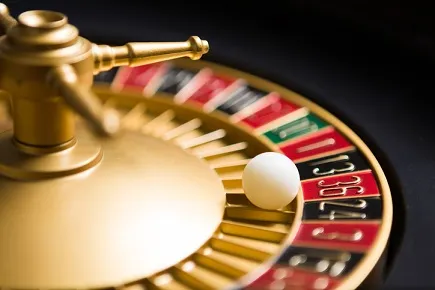
Why am I so focused on Go? Well it's an Eastern game and we have quite a healthy Korean population here at Steem. At the risk of sounding stereotypical: Koreans love to gamble. In reality, everyone likes to gamble. It's a very addictive activity, but you know what I mean. Or maybe you don't. I have quite the bias from doing so much gambling myself. In my experience people of Asian decent are the most aggressive and biggest risk takers of anyone. I'm not trying to be offensive here, but I've literally made tactical decisions based off of this stereotype and profited from it (like calling an all-in when I wanted to fold). It is what it is.
I believe that attaching Go to this platform with a gambling aspect will drastically improve our popularity with Korea. You wouldn't even have to be a player to make bets. Just look at Online-go.com and imagine being able to bet a few SBD on the outcome of any one of these games. It really could be something.
Programming
I've already completed the vast majority of the backend logic for Go. Using the same concept of recursion on my reversi game it was actually pretty easy.
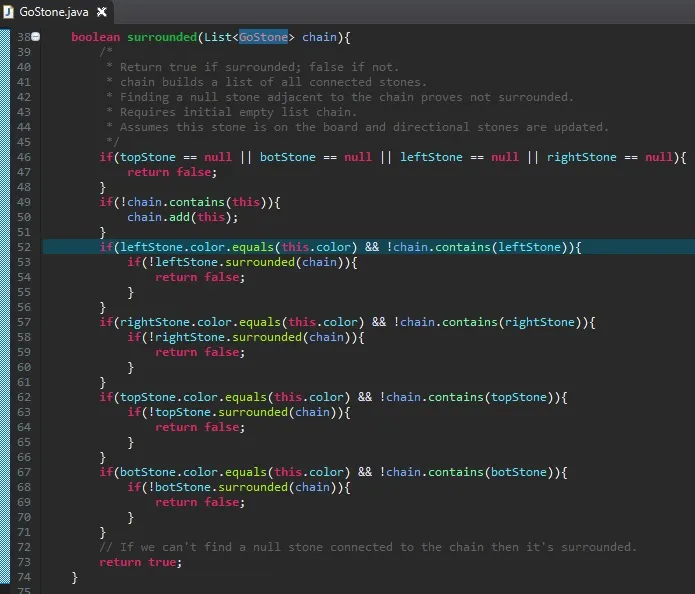
Want to know if a stone is surrounded? Simply find an empty space on the board next to the formation you're checking. If you don't find one that implies that the formation is indeed surrounded. I find it very interesting that recursion is basically like the scientific method. It's much easier to disprove something (not surrounded) than prove it (surrounded).
In any case, if you like strategy games and you've never heard of Go, give it a whirl. You might be surprised at how in depth this (possibly four thousand year old) game really is.
https://online-go.com/puzzles is a great place to solve Go puzzles that teach you how to play the game at a more advanced level.
https://senseis.xmp.net/ is a great place to learn Go strategy by the book.
